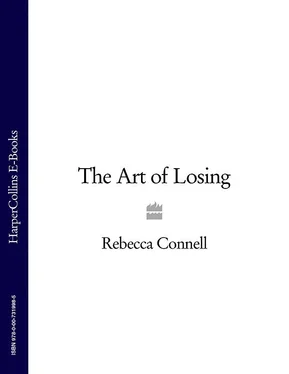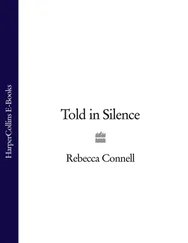REBECCA CONNELL
For my parents, Nigel and Elaine, and my husband, Daniel Cormack – thank you for all your love and support so far.
Title Page REBECCA CONNELL
Dedication For my parents, Nigel and Elaine, and my husband, Daniel Cormack – thank you for all your love and support so far.
Chapter Louise Chapter Nicholas Chapter Louise Chapter Nicholas Chapter Louise Chapter Nicholas Chapter Louise Chapter Nicholas Chapter Louise Chapter Nicholas Acknowledgements Copyright About the Publisher
Until I was ten, my father told me a bedtime story every night. I suppose that in the early days the stories covered the usual ground, but after my mother died, they changed. His new stories were all about her. Some time she would attempt to disguise them a little, holding up a book as if he were reading from it, but I wasn’t fooled. Other times he would simply sit at my bedside and pour out memories – his own, and those she had passed on to him. Often they made him cry, and I would comfort him.
I thought for many years that the stories were my father’s way of keeping her alive for me; that he was anxious not only that I should not forget her, but that I should learn even more about her than I would have done if she had lived. Now I don’t believe those were his motives at all. It was simply that there were no other stories he could tell. When she died, it closed off all other avenues, and for many years circling around these old memories was a compulsion and not a choice.
The last story he ever told me started off innocuously enough. Out at a party together, my parents had begun talking to a woman who claimed to be clairvoyant, and my father, instantly fascinated, asked her to read their future. The woman spun a pretty tale: two children, plenty of travelling, long and happy lives. My mother seemed to accept her words readily enough, but when they left the party she exclaimed how ridiculous it had been. Still basking in the rosy glow of the predicted future, my father was a little hurt, and questioned her on how she could be so sure that everything the woman had foreseen would not come to pass. She stopped dead in the middle of the road to face him, and said, evenly and quietly, Because I won’t live past forty . Irrational as they were, her words upset my father, and he demanded to know what she meant. She shrugged, and refused to elaborate. The next day, when he asked again, she claimed drunkenness and laughed the incident off, but in retrospect he believed that she was the one with the second sight – another attribute, albeit unwanted, to add to her extensive list.
When he finished this tale I was quiet, not knowing how or what I should reply. The point of the stories had always been that they were happy, but this one had left an unpleasant taste in my mouth and an eerie feeling sliding up and down my spine. My father was quiet, too, for a long while, staring down at the pink patterned coverlet. Although I can’t remember his expression, I can guess at what it would have been: the familiar lost, uncomprehending blanket of despair that was his face’s default setting after his wife’s death. After what seemed like hours, he heaved himself to his feet and left the bedroom without a word. When the next night came I half dreaded the bedtime story, but there was none forthcoming. The explanation was that I was getting too old for such things. Even at that age I knew better. The truth was that I was too young for the stories he had left – the stories he really wanted to tell.
I exercise it rarely, this talent I have. Scurrying down darkening streets, shivering in my rain-slicked clothes, I allow my muscles to relax into a familiar rhythm. I’m a dancer remembering a long-forgotten dance, a gymnast whose body instinctively recalls the twists and turns set aside many years ago. I haven’t played this game since school. Back then, Iused to skulk behind an admired teacher as he made his way from classroom to car park, always keeping a few steps behind. As he unlocked his car and drove off I would be there watching, only yards away, my breath still shallow from the excitement of the pursuit. Henever noticed me. I have this talent for following.
The man I am following now is just as oblivious. He thinks he is alone, but ever since he left the lecture hall, I’ve been with him. Down the high street, I slide through the crowd like mercury. His heavy burgundy coat glints wetly ahead like a jewel. As I keep my eyes on that coat now, I can’t help but compare it to my own. I want to be wrapped up in his coat, engulfed in its warmth. It would swamp me; he must be six foot two, a clear eight inches above me. It would smell of – what? Cigarettes: I saw him light up as he left the hall, cupping his hand to shield the tiny flame from the wind. I’m getting too close. I hang back as his pace slows, counting my steps in my head.
Abruptly he stops, as if hearing his name called. I shrink back into the recesses of a doorway as he puts a hand to the back of his neck. He’s forgotten something, perhaps – a book, an umbrella, a scarf. No. He’s simply forgotten himself – passed his destination. He hurries back up the road and ducks into a brightly coloured café, swinging the door shut behind him. I wait a few moments, then sidle up to the café, leaning back against its wet orange wall. Through the rainwater that streaks the window-glass, I watch. He’s settled into a table near the window, rummaging in his bag to withdraw a newspaper, turning the pages with the enjoyment of a ritualised routine. A minute later, a waitress brings him a cup, and I see his lips move in silent thanks. I watch him for five, ten minutes. His black hair is heavily threaded with silver; closer than I’ve been before, I can see fine lines exploding out across his face. I know that he must be fifty-five years old.
The letter he wrote almost twenty years ago is in my pocket. Its words are always with me. They run through my head when I talk, an almost-heard undercurrent bubbling just below consciousness. I tap them on an imaginary keyboard, my fingers digging privately into my palm. Close to my heart, I keep them folded up tightly in their faded paper everywhere I go. The name at the top of this letter is not mine, but I intend to borrow it for a while.
The lights in the café are so dizzily bright that when Lydia turns away they’re still imprinted on the damp grey alleyway in front of her like the afterglow of a camera flash. She blinks, once, again, to jolt herself out of the cocoon he has wrapped her up in. It works. The cold returns and clamps her like a vice. Suddenly she’s alone on the street with no idea where she is.

Lydia wakes without warning, dragged up sharply by the sudden dip of her elbow off the ledge. For a second she glances around bewildered, expecting to see the cool blue walls of the rented attic room encircling her. The dreamlike hour that has passed drips back into her mind: rising after too little sleep, riding down town to the faculty lecture hall in the November half-light, falling into her seat. When she arrived the hall was almost deserted. Now it’s packed with students, huddled in little groups and chatting, their steady buzz of conversation punctuated by shrieks of laughter and groans of disbelief. A few are still snoozing, heads pillowed on the wooden ledges. Undisturbed, Lydia watches them all. The snatches of conversation she picks up are inane but compelling. She has never had this: the easy banter between friends, the talk of nights out unrestricted by parental guidelines or curfews.
Читать дальше













